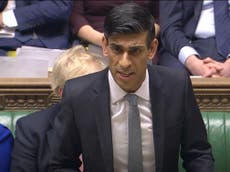Coronavirus? Rishi Sunak is getting it done.
The NHS? Rishi Sunak is getting it done.
Small businesses? Rishi Sunak is getting it done.
Climate change? Rishi Sunak is getting it done.
Beer, wine, petrol, cider, potholes, tampons, flood defences, the A303, plastic, blue-sky thinking, electric cars, national insurance, VAT, the Pant-Llanymynech bypass, broadband, railways, further education? Rishi Sunak is getting them all done, done, done, done done, done, done, done, done, done, done, done, done, done, done, done, done and done.
Is there an odd job you’ve just not got round to? My firm advice would be to hang around outside the Treasury building, mention it to Sunak and it’ll be in next year’s budget speech at the very latest. “Regrouting Ian from Cricklewood’s bathroom? Painting Dave’s mum’s shed? This government is getting it done.”
Oh to be married to Sunak. “Rishi, it’s bi-
“Taking out the bins? Your husband is getting it done.”
It helps that Sunak, with his pipe-cleaner arms, obsequious smile, and hair like its been carefully combed by his mum for the annual school photo, bears every outward resemblance to a very small boy.
Because it helped to lend Budget 2020 its crucial fairy story feel. With his first wish, Sunak got the job of his dreams. With his second, Sunak got the ultimate dream of every former Goldman Sachs banker – infinite money.
The phrase “getting it done” made around 21 appearances. Only one phrase, or one word outdid it, and that was “billion” which appeared fully 47 times.
I have done my very best to add up the numbers attached to these 47 appearances, and I think the answer is, at least £972bn and at most, well, infinity.
The NHS, will be given “millions, billions, whatever it takes” to deal with coronavirus, he said. There is suddenly no amount of money for the NHS which cannot be found, which for those of us who had to listen to Theresa May and Jeremy Corbyn have soul-crushing, point-scoring arguments about it for what felt like a thousand years, is particularly annoying.
Though less annoying, one imagines, than for the parents of a small boy with pneumonia being kept warm by a pile of anoraks on the floor of a Leeds hospital, whose existence Boris Johnson tried to wish away by nicking a reporter’s phone and putting it in his pocket.
Still, that no expense will be spared to deal with coronavirus is reassuring in its way.
At a generous estimate, Sunak spoke around 60 yards away from Nadine Dorries’ office door, that has now been crossed with police tape and marked “Covid-19 – Do Not Enter”.
Were this any other workplace, it is very hard to believe it would not have been shut down.
This was not so much the magic money tree budget as the magic forest.
People who know a lot more about economics than me will tell you that countries aren’t like people. If you’ve got no money, you really can spend what you haven’t got and make yourself richer.
For roughly a decade, Conservatives have laughed at this, by way of justification for stripping public services back to their bare bones and beyond, at the same time as doubling the national debt from £1 trillion to £2 trillion in the 10 years in which they have governed the country.
Now, they cheered it on. It is four years since the people who now run the country, convinced the voters to say yes to an ideological cause that has cost us, so far, an estimated £600bn in lost economic growth. There is also a coronavirus recession looming on the horizon, and yet now really does appear to be the moment that money has ceased to be an object.
A £30bn fiscal stimulus, £175bn “for our future prosperity”, £5bn of “export loans for businesses”, a £1.4bn science and research institute, £22bn on “R and D”, £5.2bn on flood defences. It was like watching some sort of weird hyper-inflated Saturday night game show. Whatever it was, Sunak had a billion quid to throw at it.
Of course, the most entertaining part of any Budget Day is never the Budget itself (obviously) but the time it takes for it to collapse afterwards, for which George Osborne’s 2012 effort still holds the record, though Philip Hammond ran him close a few times.
This one certainly had its moment.
“For the first time ever,” Sunak said, “the billions of pounds we would have sent to the EU, we can now spend on our priorities.”
The Budget’s red book contains a line on that. In year one, ie this year, that number is £4.1bn. In five years time, there is a very slim chance it might be as high as £14bn, or, £269m a week. Not bad, but even by the government’s own estimates, it is significantly smaller than the very big lie down the side of a bus that probably once drove through a town near you.
Asked specifically about this, a government spokesperson made clear that comparing the two figures is a “false equivalence”. Yes, that’s right. Comparing the money we said we’d get back from the EU to the money we actually are getting back from the EU, is completely not on. Apparently, this is because it doesn’t take into account the vast amounts of cash UK negotiators have since agreed to pay the EU in various divorce settlements. So now you know. It’s fine to tell lies as long as they’re so big that nobody believes them.
The only available coping strategy is laughter. And what’s £350m a week anyway, now that Sunak’s turned on the money hose?
Traditionally, at the end of Budget Day, the Treasury team go to the Two Chairmen pub in Westminster for a well-earned pint. Beer duty may have been frozen, but if the landlord has any sense, he’ll up the price of a pint of Broadside to at least £1bn. Sunak won’t even blink.








Join our commenting forum
Join thought-provoking conversations, follow other Independent readers and see their replies